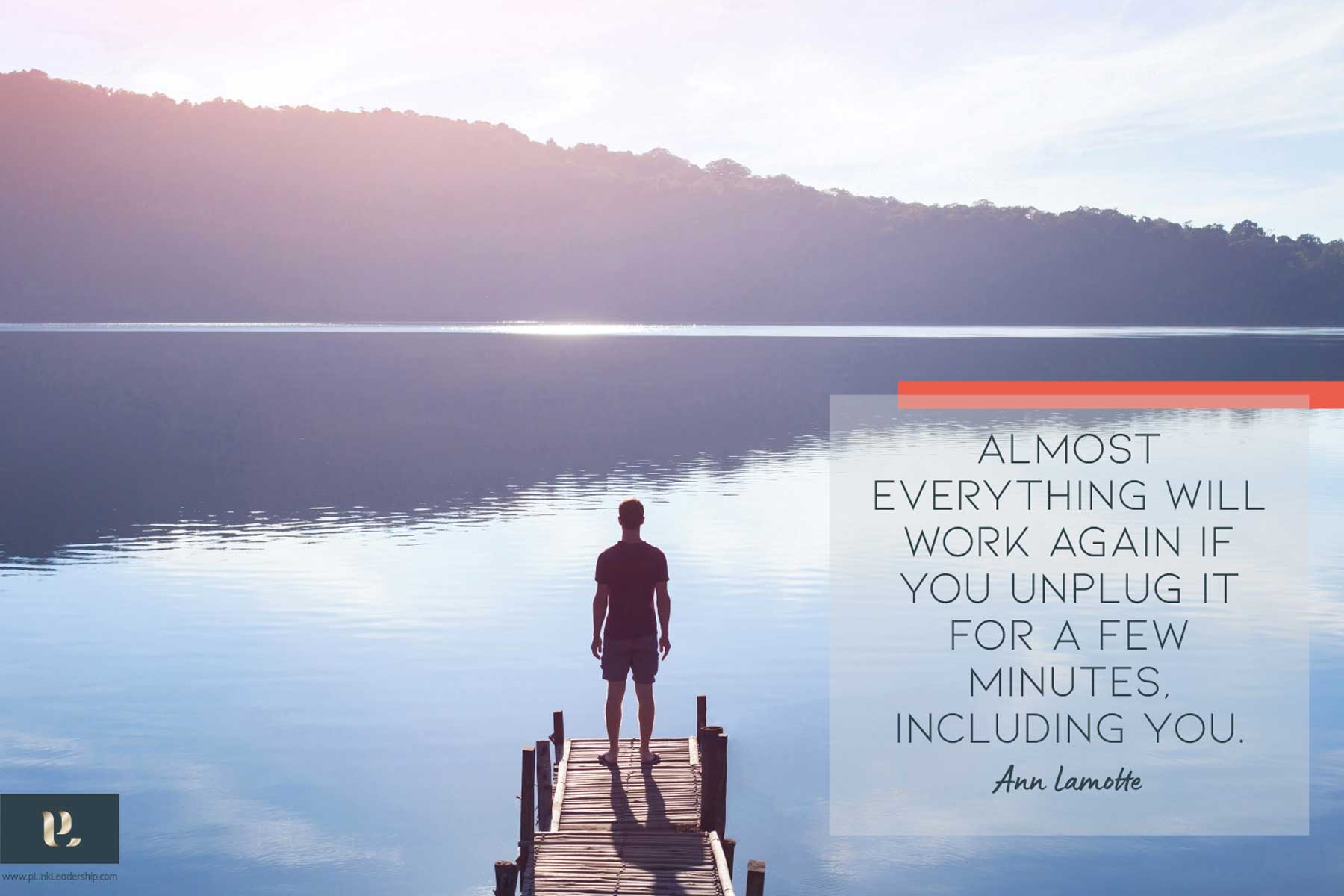Ahh vacation … the feeling of warm sand in your toes, a tasty cocktail in hand, and the sweet sound of work email pinging on your phone. Wait, what?! That sounds more like working remote from an expensive and exotic locale versus taking a vacation. And yet, 60% of employees report that they do some work while they are on vacation. At our company, we call this kind of time off “beige space.”
Beige space is when one of us takes time off but blurs it by checking emails and popping in and out of Slack when we are supposed to be out of office. Alternatively, what we encourage our pLink Leadership team to go for is “white space,” meaning time and space that’s free of any work commitments or responsibilities. We encourage white space so our team can truly disconnect from work, re-connect with their loved ones, and experience rest and relaxation with no strings attached. We hope to encourage you to do the same.
Vacation is a great way to reboot all three of your operating systems: the cognitive, the physical, and the emotional systems. Here are six reasons why you should prioritize taking vacations and disconnecting from work this year.
- Enhanced Brain Performance (Cognitive System) – Taking a time out and loosening your focus on your work will allow your mind to wander and do some sub-conscious mental filing and organization. When we allow the mind to wander and relax our attention, we often make connections that are not available to us when we are acutely focused on our projects. Have you ever solved a problem in the shower or after a good night of sleep? That’s your sub-conscious brain at work.
- Deeper Personal Connection (Emotional System) – Relationships with others improve our well-being, according to Dr. Martin Seligman’s well-being theory, PERMA. Going on a vacation or taking time off from work allows us to be fully present for the people that matter most in our lives. It is rare to be in the presence of someone and have their full attention these days.
- Improved Physical Health (Physical System) – Time off is good for our physical health. Health benefits include lowering heart rate and blood pressure, which in turn can lower the risk of heart disease and chronic illness caused by stress. Many people sleep better for up to two weeks after they’ve returned from vacation.
- Improved Emotional Health (Emotional System) – Regular vacations can help lower anxiety and reduce stress. Vacations can be a great source of positive emotion, providing opportunities to strengthen relationships and to experience engagement within, all of which lead to improved well-being.
- More Innovative Thinking (Cognitive System) – When we discover and explore new places, we gain new perspectives. We need novelty in our lives to fuel our innovative mindset. Novel experiences can encourage new neural pathways to be built in the brain and spark new insights and increase the association of disparate ideas. In one study, cognitive flexibility (the component of creativity that allows us to adapt our thinking to face new and unexpected conditions) has been shown to be increased after a long summer holiday.
- Increased Team Capacity (Bonus) – When you truly disconnect from your work as a leader, your team has an opportunity to grow and learn in your absence. They have to grapple with tough decisions without your guidance and trust their own instincts. This can improve agency and capacity in the people on your team. As your team’s capacity grows, it can free you up in the future to work at a more strategic level.
pLink Leadership Tips:
- Positive leaders we work with, who are successful in disconnecting while on vacation, practice sitting down with their teams before they leave and talking to them about what decisions are okay and not okay to make while they are out of office. Healthy boundaries are important so that teams feel confident operating in the absence of their leader. As Brené Brown says, “Clear is kind, unclear is unkind.” The clearer you can be, the more relaxed and effective your team can be while you are away.
- Positive leaders model taking time off and not checking in, so their team knows it’s okay for them to do the same!
- Positive leaders talk about and celebrate time off as a way to recharge.
If you haven’t had a vacation in a while, and the idea of a 10-day tropical voyage feels like too much, start with a 3-day weekend or a staycation. Notice what feels easiest and go for it! Your organization and you will benefit from a little time off!
What are the pLink team members doing for summer vacations this year?
Helen: The beach
Gretchen: Maine for two weeks
Jennifer: UK Adventure in England, Ireland, and Scotland!
Alexis: Backpacking in the Trinity Alps
Erica: Tanzania
Cindy: Wolf Preserve in Ely, MN. With an Aussie
Stacie: Vegas with Dad for an Eagles Concert
Renee: Cape Cod for 4th of July!
Stephanie: Staycation in Snoqualmie Valley, WA
Kristyn: Wisconsin Dells and Baraboo with the family



